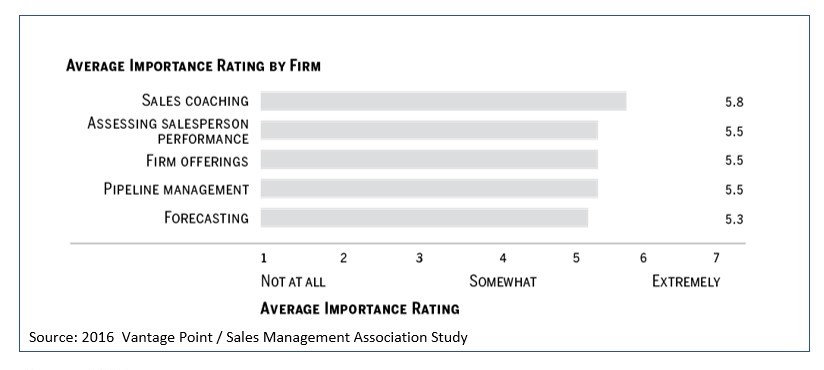Why Your Sales Managers Don’t Coach
Part 1 of a 3-part series. Sales coaching is a hot topic. In fact, recent research Vantage Point conducted with the Sales Management Association indicates that sales coaching is the most important skill for sales manager training. In this first in a series of three blogs, we outline why sales managers don’t coach. In the second and third blogs we will examine the building blocks of effective coaching, sharing research-based insights that help high-performing managers get 30% more of their sellers to quota, and provide you with key takeaways.

Why Coaching is Important
Our research revealed that the top 25% of sales managers coach in ways that generate $3.5 million more revenue than their lower-performing peers. In fact, the bottom 75% of managers in the study failed to get even half of their salespeople to quota. And that’s not all. The difference in the percentage of salespeople at quota for the bottom 25 percent of managers and the middle 50 percent of manages was only one percent. Yes, you read that right. Only one percent.
Although sales coaching is vitally important, it is also a misunderstood topic. Different models, methodologies, and definitions for “sales coaching” abound, yet little coaching occurs. VantagePoint set out to bring clarity and structure to this tangled web, and our research yielded staggering new insights that change the game for sales managers.
What is Sales Coaching Anyway?
To take the guesswork and mystery out of sales coaching, it was necessary to dig into the details of management coaching practices. It took the better part of a year to develop the survey instrument to gather relevant data. We examined the types of coaching managers provide (call coaching, opportunity coaching, account coaching, and territory coaching), the frequency with which they coach, the formality of their coaching, and finally, the content of their coaching conversations. In addition, we examined the level of formality of the sales processes these managers use to augment and support their coaching efforts. We then analyzed all the data to determine which practices were correlated with quota attainment.
Why Your Sales Manager’s Don’t Coach
- Demanding Environments
We made some interesting coaching-related discoveries. Well-trained managers are not coaching; even managers who have been through four or five coaching trainings are not coaching. Does this mean most managers don’t know how to coach? No – we would argue that they do. They are not coaching because the environment in which they work is not conducive to it, and it is in fact downright hostile to coaching.
Today’s sales managers are more distracted than ever before. Sales leadership demands forecasting, and sales operations demands CRM usage. Sales enablement and human resources demand sales rep assessments and developmental plans. Marketing demands input for its plans and follow-up on campaigns. Salespeople need help with pricing and resolving customer issues. Is it any wonder coaching isn’t happening?!
- Misdirected Training
As if the environment weren’t bad enough, organizations also misfire in their attempts to train sales managers to coach. Managers receive generic coaching training that is well-meaning, but irrelevant. The two biggest offenders of this ilk are Situational Leadership® and the GROW® model. We have encountered hundreds of companies post training, and time after time, once we peek under the hood of the salesforce and talk to real sales managers, they report not using these models. Why? Because they do not relate to the realities of what sales managers do day in and day out. Even worse, they don’t equip sales managers to help their salespeople become better sellers.
Of course, not all coaching training falls into the “generic” category. Managers also receive training on how to coach to particular sales methodologies. Managers will attend sales training along with their teams and then receive an extra half day on how to coach that methodology. In most cases, organizations train multiple sales methodologies. For example, an organization may have trained their salesforce on SPIN Selling®, Strategic Selling®, as well as the Challenger Sale®.
Fast forward to the culmination of all this expensive coaching and leadership training. Imagine you are a sales manager who has received five versions of coaching training. Which one do you use? When? How do you know? Are you really supposed to use five different coaching tools? What do you do with five different cadences for five different coaching conversations? The confused and bewildered sales manager throws up his or her hands and goes back to prior practices. Why? Because that is the only thing that makes logical sense.
How Can You Help Your Sales Managers Coach?
Between the all-too-real demands of a sales manager’s job, the multitude of pressures being exerted, and the training misfires they have endured, is it any wonder that so little coaching takes place? Stay tuned for the next blog when we’ll discuss what effective coaching looks like and how you can implement it for your own sales team.
VantagePoint Performance is now part of Imparta, a global leader in performance improvement for customer-facing teams.
